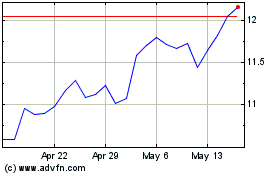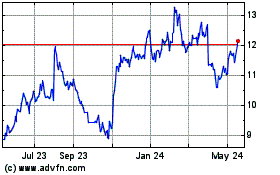By Dustin Volz
WASHINGTON -- President Biden's decision this week to punish
Russia for the SolarWinds hack broke with years of U.S. foreign
policy that has tolerated cyber espionage as an acceptable form of
21st century spycraft, analysts and former officials said.
In announcing a suite of punitive measures against Moscow,
including financial sanctions and diplomatic expulsions, the White
House made clear its actions were in response to "the full scope of
Russia's harmful foreign activities."
The administration specifically highlighted what it said was
Russia's yearslong meddling in U.S. elections. It also said U.S.
intelligence had "high confidence" that Russia's foreign
intelligence service, the SVR, was behind last year's SolarWinds
hack, which compromised at least nine federal agencies and about
100 private-sector organizations.
The administration said both campaigns were unacceptable and
demanding of a forceful response.
The U.S. has punished Russia for election interference in the
past, notably after its multipronged operations during the 2016
election. But previous administrations typically refrained from
retaliating for cyber intrusions they classified as political
espionage -- no matter how broad or successful -- in part because
the U.S. and its allies regularly engage in similar conduct,
current and former officials said.
Both the Obama and Trump administrations sought to forge
international agreement that cyberattacks that stole intellectual
property, damaged computer systems or interfered in elections were
out of bounds -- while generally accepting espionage as fair play.
In 2015, for example, after the U.S. learned the Chinese had
ransacked the federal government's personnel files and made off
with sensitive records on more than 20 million Americans, James
Clapper, then the director of national intelligence in the Obama
administration, paid begrudging respect.
"You have to kind of salute the Chinese for what they did," Mr.
Clapper said at the time. "If we had the opportunity to do that, I
don't think we'd hesitate for a minute."
Western intelligence operations have also launched large cyber
espionage operations against foreign private sectors, as the
SolarWinds hack did, said Thomas Rid, an expert on Russian cyber
operations and a professor at Johns Hopkins University.
Some U.S. officials advised the Biden administration not to
justify sanctions specifically on the SolarWinds operation, as that
move could open up the U.S. to foreign censure for its own
activities, said people familiar with the situation.
"The hard question therefore is this: How was SolarWinds
different from high-end Five Eyes intelligence operations?" asked
Mr. Rid, referring to the name used for a cadre of Western
intelligence powers.
Administration officials deemed the SolarWinds hack beyond the
boundaries of acceptable cyber operations because of its scope and
scale. A senior administration official said Thursday the
retaliation was additionally justified because the burden of
repairing the damage largely fell on private companies and because
Russia had shown in the past it can turn an espionage operation
into something more destructive.
"The speed with which an actor can move from espionage to
degrading or disrupting a network is at the blink of an eye, and a
defender cannot move at that speed," the official said. "And given
the history of Russia's malicious activity in cyberspace and their
reckless behavior in cyberspace, that was a key concern."
Many Democrats, including Senate Majority Leader Chuck Schumer
of New York, as well as Republicans praised the actions Mr. Biden
took Thursday, and urged him to be even more forceful.
Others, however, were less sanguine. Rep. Jim Langevin (D.,
R.I.), a leading cybersecurity voice in Congress who generally
praised Mr. Biden's actions against Russia, said the sanctions
slapped on the SVR for the SolarWinds hack needed more
explanation.
"The SolarWinds incident that the administration today
attributed to the SVR has had all the trappings of traditional
espionage that, while unfortunate, has not historically been
outside the bounds of responsible state behavior," Mr. Langevin
said. Mr. Biden and Secretary of State Antony Blinken should
"explain the contours of their new policy," Mr. Langevin said.
Chris Painter, a top cybersecurity official at the State
Department during the Obama administration, said that the
administration's argument was unpersuasive.
"Most intrusions can be used for destructive ends," Mr. Painter
said. Even if the attack was purely espionage, though, the U.S. is
still within its rights to react "not to enforce a global norm but
to demonstrate displeasure," he said.
In an analysis for the national security blog Lawfare, Bobby
Chesney, a national security law professor at the University of
Texas, said the Biden administration had not declared all cyber
espionage is off limits. Rather, in announcing its response to
Russia, the administration outlined a vague matrix of conditions
that, if met, could elevate certain "malicious cyber activities" to
a level that warranted retaliation, he wrote.
"Is it clear that there is an answer to the question of what
line SolarWinds crossed?" Mr. Chesney asked. "Not really."
Write to Dustin Volz at dustin.volz@wsj.com
(END) Dow Jones Newswires
April 17, 2021 05:44 ET (09:44 GMT)
Copyright (c) 2021 Dow Jones & Company, Inc.
SolarWinds (NYSE:SWI)
Historical Stock Chart
From Nov 2024 to Dec 2024

SolarWinds (NYSE:SWI)
Historical Stock Chart
From Dec 2023 to Dec 2024
